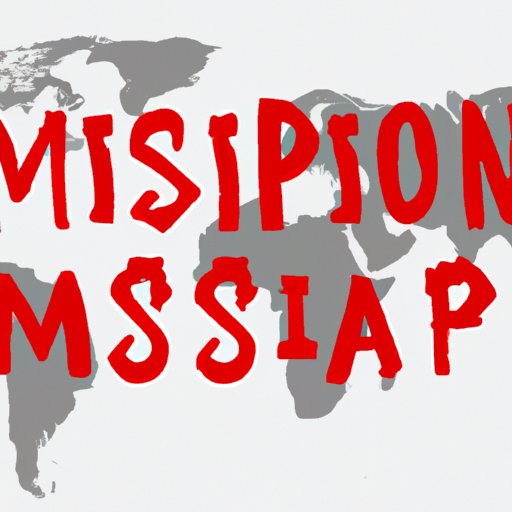Introduction
Mission trips, or short-term volunteer trips to foreign countries, have become increasingly popular in recent years. Participants typically engage in activities such as providing medical care, building homes, or teaching English. While these trips can be beneficial to the communities they visit, there are also potential negative consequences that must be taken into account.
Negative Impact on Local Economies
One of the most significant concerns with mission trips is their potential to disrupt local economies. Mission trips often involve volunteers who are not trained in the local labor market and do not pay wages, which can lead to unfair labor practices. In addition, mission trips can displace locals from their jobs and drive up prices due to an influx of money from outside sources.
Unfair Labor Practices
Mission trips often involve volunteers who are unskilled in the tasks they are performing. This can create unfair competition for local workers who are more qualified and experienced but lack access to resources. As a result, local workers may be unable to find employment or be paid less than they would otherwise receive.
Displacement of Locals
In some cases, mission trips can cause locals to lose their jobs due to the influx of volunteers. For example, in places where construction work is needed, volunteers may be brought in to build homes or other structures, displacing local builders and masons.
Inflation of Prices
Mission trips can also lead to inflation in local markets due to the influx of money from outside sources. This can make basic goods and services unaffordable for locals, leading to further economic hardship.

Negative Impact of Cultural Imperialism
Another major concern with mission trips is their potential to promote cultural imperialism. This involves imposing one’s own culture on another without regard for local customs and beliefs.
Ignoring Local Customs and Beliefs
When mission trip participants impose their own values and beliefs on the locals, they risk ignoring or disregarding important cultural customs and traditions. This can lead to misunderstandings and conflict between locals and volunteers.
Assumption of Superiority
Mission trip participants may also assume that their way of life is superior to that of the locals. This can lead to feelings of superiority among volunteers and resentment among locals.
Disrespect for Local Traditions
Mission trip participants may also neglect to respect local religious and cultural traditions. This can lead to tension between locals and volunteers and can be seen as disrespectful and offensive.
Unsustainable Development Practices
Many mission trips rely on short-term solutions that do not take into account the long-term needs of the communities they serve. This can lead to projects that are unsustainable and of low quality.
Short-Term Solutions
Short-term solutions such as building homes or providing medical care may provide immediate relief, but they do not address the underlying issues that led to the need for assistance in the first place. This can lead to projects that are ultimately ineffective.
Lack of Community Involvement
In some cases, mission trips may fail to involve the local community in the decision-making process. This can lead to projects that do not reflect the needs and desires of the locals and may be ineffective or even damaging.
Low Quality of Work
Mission trips often involve volunteers who are inexperienced and untrained in the tasks they are performing. This can lead to projects of poor quality that may need to be redone or repaired later on.
Lack of Long-Term Commitment
Many mission trips are only committed to short-term projects. This can lead to projects that are not completed or do not have the necessary follow-through to be effective.
Short-Term Projects
Mission trips often focus on short-term projects that do not address the underlying causes of poverty or other issues. This can lead to projects that are unsuccessful or incomplete.
Lack of Follow Through
Without a long-term commitment, mission trips may not have the necessary follow-through to ensure that projects are successful. This can lead to projects that are abandoned or not maintained properly.
Potential for Exploitation
Mission trips can also lead to exploitation of both locals and participants. This can include unsafe working conditions, low wages, and unethical treatment of participants.
Unsafe Working Conditions
Mission trips can involve volunteers working in unsafe environments with inadequate safety measures. This can lead to injuries and even death in some cases.
Low Wages
In some cases, mission trips may offer locals low wages or no wages at all. This can lead to further economic hardship and exploitation of local workers.
Unethical Treatment of Participants
Mission trips can also involve participants being subjected to unethical treatment, such as verbal abuse or sexual harassment. This can lead to psychological trauma and even physical injury in some cases.

Risk of Harm to Participants
Mission trips can also pose a risk of harm to participants. This can include physical injury, psychological trauma, and exposure to disease.
Physical Injury
Mission trips can involve volunteers working in dangerous or hazardous environments. This can lead to injuries such as cuts, burns, or broken bones.
Psychological Trauma
Mission trips can also involve witnessing or experiencing traumatic events. This can lead to psychological trauma such as depression, anxiety, or post-traumatic stress disorder.
Exposure to Disease
Mission trips can also involve exposure to diseases that are common in the area. This can lead to illness or even death in some cases.
Conclusion
Mission trips can have a tremendous impact on the communities they visit. However, it is important to be aware of the potential for mission trips to be unsustainable, disrespectful, and exploitative. To ensure that mission trips are truly beneficial, organizations should strive for sustainability, respect local customs and beliefs, and avoid exploitation of both locals and participants. With greater awareness and responsibility, mission trips can be a force for good.
(Note: Is this article not meeting your expectations? Do you have knowledge or insights to share? Unlock new opportunities and expand your reach by joining our authors team. Click Registration to join us and share your expertise with our readers.)
